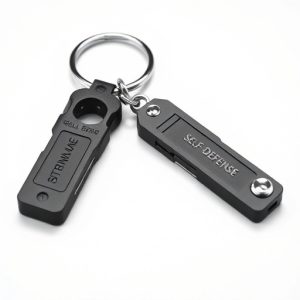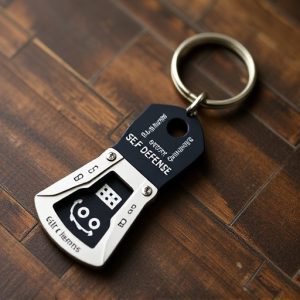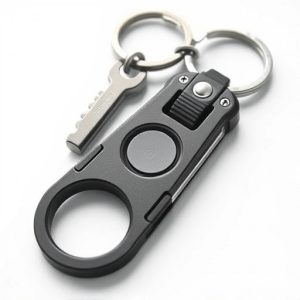Navigating State Laws: Concealed Keychain Protection for Women
US states have updated laws to allow women to carry concealed keychain protection devices for self-d…….
US states have updated laws to allow women to carry concealed keychain protection devices for self-defense, empowering personal safety in public spaces. However, understanding state-specific regulations regarding age restrictions, permit requirements, and carry locations is crucial before utilizing these tools legally and responsibly. Researching local statutes ensures compliance, aligning personal security with community welfare and avoiding legal issues. When choosing a device, consider specific needs like blade sharpness or pepper spray, lightweight designs for discreet daily carrying, or advanced tactical features for extra deterrence.
In today’s world, personal safety is paramount. For women seeking enhanced security, concealed keychain protection devices offer a discreet yet powerful self-defense option. This article navigates the intricate legal landscape surrounding these innovative tools, exploring state-by-state guidelines on their use. We delve into who can carry and where, dispel myths, and guide readers in selecting the ideal defense keychain for their unique needs, ensuring they make informed decisions regarding their well-being.
- Understanding State Laws on Concealed Keychain Devices
- Who Can Carry and Where: Women's Rights and Restrictions
- Legal Considerations for Self-Defense and Security
- Choosing the Right Defense Keychain for Your Needs
Understanding State Laws on Concealed Keychain Devices
In many states across the US, the legal landscape surrounding concealed keychain protection devices has evolved to cater to diverse safety needs, including those of women who seek personal security while on-the-go. These tiny yet powerful tools have gained popularity as a means of self-defense for women who may find themselves in vulnerable situations. It’s crucial for users to understand their state’s specific laws governing the legal carry of such devices. Each state has its own set of regulations, including age restrictions, permit requirements, and places where open or concealed carry is permitted.
For example, some states allow for the legal carry of concealed keychain weapons without a permit, while others mandate a hidden carry permit. Women considering the use of these devices should research their state’s statutes to ensure compliance with local laws. This knowledge not only guarantees that they are using these tools responsibly but also provides peace of mind, knowing that they are acting within the boundaries of the law.
Who Can Carry and Where: Women's Rights and Restrictions
In many states, women have the legal right to carry concealed keychain protection devices for self-defense. This is an empowering aspect of personal safety that allows women to protect themselves in various public settings. However, it’s crucial to understand the specific guidelines and restrictions that come with this right. The “where” is as important as the “who.”
Women can generally carry these compact self-defense devices in public places, including restaurants, shopping centers, and parks, as long as they comply with state laws. This often involves adhering to certain age requirements and obtaining a permit or license for concealed carry. Some states have specific rules about where these devices can be carried openly or concealed, ensuring balance between personal safety and public comfort.
Legal Considerations for Self-Defense and Security
When it comes to self-defense and security, especially for women who carry keychains as a form of personal protection, understanding legal considerations is paramount. Many states in the US have specific regulations regarding concealed keychain protection devices, ensuring that citizens can exercise their right to bear (or in this case, carry) such tools responsibly. These laws vary across jurisdictions, but they typically focus on balancing individual safety and the community’s well-being.
Women considering keychain self-defense options should be aware of the legal boundaries and restrictions in their area. Some states permit the open or concealed carrying of such devices for personal protection, while others may have strict regulations, especially regarding the type, size, and capacity of the device. It is crucial to research and adhere to local laws to avoid any legal repercussions. Additionally, understanding the intent behind these guidelines—to promote safety and prevent misuse—is essential for responsible carry practices.
Choosing the Right Defense Keychain for Your Needs
When selecting a defensive keychain for concealed carry, it’s crucial to consider your specific needs and preferences. For women seeking personal safety, a keychain designed with self-defense in mind can be a powerful tool. Look for keychains equipped with features like sharp blades or pepper spray, offering immediate protection in potentially dangerous situations. These devices are compact and easily portable, allowing you to carry them discreetly while adding an extra layer of security.
Additionally, ensure the keychain’s design aligns with your lifestyle. Some models feature lightweight construction for minimal bulk, ideal for everyday carry. Others may include advanced features like tactical grips or noise-making mechanisms to startle assailants. Tailoring your choice to personal factors ensures you’re prepared and confident in any environment, whether out alone or traveling light.
In light of these defensive keychain legal carry guidelines, women now have more options for personal protection. Understanding state laws and choosing the right concealed keychain device can empower individuals to feel secure in various settings. As self-defense becomes a priority, staying informed about one’s rights and responsibilities is crucial. By navigating these legal considerations, folks can ensure they’re prepared and protected, ultimately enhancing their sense of safety and independence.


